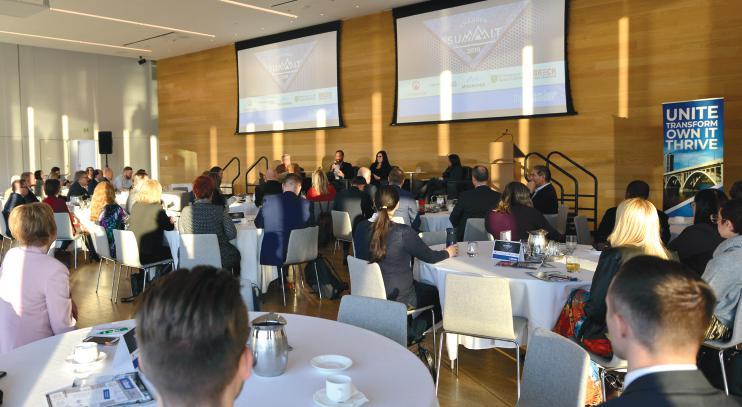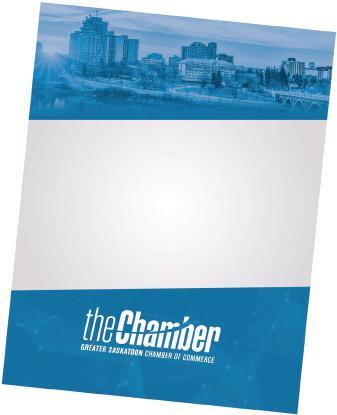
4 minute read
Advocacy
Working for You
The Greater Saskatoon Chamber of Commerce continues to actively advocate on behalf of its membership. Recent items to highlight include the following:
Advertisement
Municipal Budget Task Force
Prior to Saskatoon’s Municipal Multi-Year Business Plan and Budget deliberations, the Chamber’s Advocacy Committee assembled a Municipal Budget Task Force to assess the budget and compare it to the Chamber’s three advocacy pillars. Based on direction from our members, these pillars are competitiveness, efficiency and growth. The Task Force administered a survey duplicated from the Civic Satisfaction & Performance Survey put forward by the City of Saskatoon.

Chamber SUMMIT
The second annual Chamber SUMMIT took place on November 7, 2019. The event debuted the Chamber’s advocacy agenda for 2020 to our members. The Chamber continues to promote a competitive local business environment through taxation policies, seeking solutions to interprovincial
Municipal Budget Task Force Report

Supporting initiatives to reduce red tape and streamline processes for doing business.


Promoting local growth through workforce development, innovation and investment.
Local government and municipal affairs have the most direct impact on local business. Regulatory red tape on the municipal level has a very large impact on local businesses. Our membership has expressed concern in relation to the increase in crime and the sense of insecurity that has become prevalent in the downtown core. Crime also appears to be spreading to other parts of the City. Ensuring that the local business environment remains competitive and a top location for doing business.
We thank the City for their work to reduce Building and Development Permit wait times. We are encouraged to see that the City has heard the concerns of the Business community and has set a target of 2 to 5 weeks for the review of typical commercial building and development permits, which is a 50% improvement over current service levels. We encourage the City to continue to find efficiencies in the Permitting and licensing process. Our membership has expressed concerns around the City's practice of insourcing operational functions that were once outsourced. We encourage Council to continue to find more efficiencies within their current operations using current staffing levels without adversely affecting the private sector (i.e. eliminating outsourced projects). By outsourcing more, the City would be able to transfer risk. This will allow the city to work on other areas where they are unable to transfer risk. The concentration of the cityʼs vulnerable population in one given area is a strain on resources Within the budget we do see an increase in policing by 15 FTE in 2020 and 5.8 in 2021 as well as strategic goals to continue partnerships with various key community stakeholders. The Chamber feels that this increase in policing as well as the active community partnerships are steps in the right direction. We implore the City to explore alternative options to address the Crime and Safety issue. Rising tax rates can threaten business competitiveness and stability of a region, raising taxes weaken local businesses capacity for growth. Tax increases should be closely correlated with inflation. The proposed tax increase of 3.15% in 2020 and 3.52% in 2021 are cited as being calculated by inflation plus growth. The Chamber understands that correlating tax increases strictly in alignment with inflation may be difficult for our growing city. However, we also believe that efforts to find efficiencies and savings within the organization and keep the tax increases low is possible and recommended.
Commend Council for taking a step in the right direction by reducing business license renewal fees for Cannabis retailers from the original planned $10,000 now to $85 per year. We encourage this parity of licensing to be consistent across the board with regular licensing fees. Currently, a new business license for cannabis retailers is $20,000 while most others are $125.
Our survey findings indicated that, according to Chamber members, the City’s priorities should be as follows: 1. Crime and safety 2. Taxes being too high 3. Downtown development.
In addition to the survey, a scorecard was prepared with overall scores of a) fair for competitiveness, b) fair for efficiency, or c) poor for growth. Since the budget is multiyear in nature, a mid-point review will take place. During this mid-point review, the Task Force will once again assess the City of Saskatoon’s performance compared to the Chamber’s three advocacy pillars.
Chamber to advocate for policy changes that allow SMEs greater access to capital, more procurement opportunities and additional incentive programs.
Over the past year, political and economic instability has plagued our country and our province. The Chamber will continue to support strong fiscal policies that encourage certainty, as well as investment in our province. Efficiency of processes – at all government levels – will continue to be a priority as we enter 2020. Reductions in red tape, along with access to government administration and officials, are crucial for efficient business practices.
trade barriers, supporting trade diversification, and advocating for pipelines as another means to transport goods to market.
Seventy percent of Saskatoon’s businesses consist of small and medium-sized enterprises (SMEs). Therefore, it’s important for the Going forward, the Chamber will advocate for continued growth through workforce development. A specific focus will be placed on attracting and sustaining a skilled workforce, continuous innovation and encouraging investment. Another priority is working to address crime and safety, particularly in Saskatoon’s downtown core.








